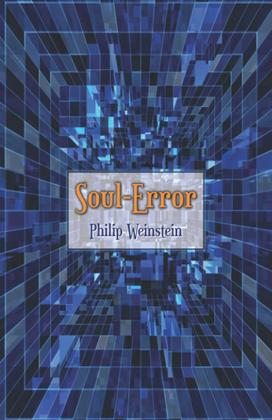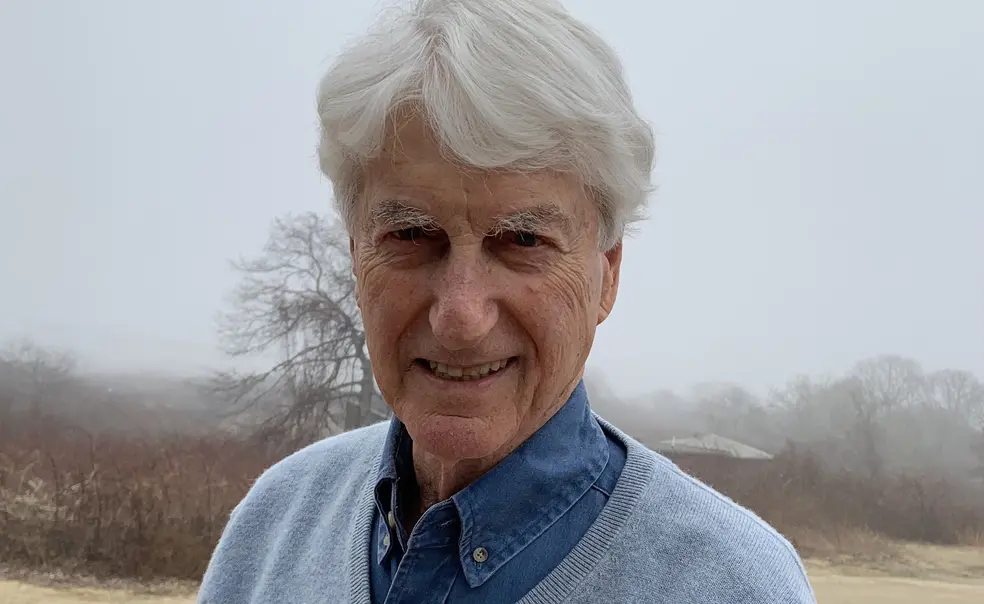Philip Weinstein ’62 encourages readers to examine the soul
The book: The title Soul-Error (The Humble Essayist Press) is inspired by the French phrase “erreur de l'âme” from the essays of the Renaissance philosopher Michel de Montaigne. The term refers to the mind’s altering relation to objects and others in time and space. Author Philip Weinstein ’62 expands on this idea in this latest book, which includes a combination of memoirs and philosophical musings throughout its 10 essays. Weinstein invites readers to approach these essays with a curious eye, as he explores “how our lives actually unfold, and how that unfolding bears on the life of the mind.” 
The author: Philip Weinstein ’62 is an emeritus professor of comparative literature at Swarthmore College, where he taught for more than 40 years. He studied English as an undergraduate at Princeton. He’s the author of nine publications on literary criticism including Unknowing: The Work of Modernist Fiction and The Semantics of Desire: Changing Models of Identity from Dickens to Joyce. His latest work, Soul-Error, was chosen for Best American Essays in 2020.
Excerpt:
Soul-Error
The soul as committed to error? Though not a Freudian, I begin with Freud. In his essay on “The Uncanny,” Freud explores those moments when one sees “out there” something palpably shaped from “in here.” Freud’s most striking vignette rehearses how, some years earlier, he found himself wandering through an unknown Italian village, looking for the train station. He perused his map, made the appropriate right and left turns—and found himself in the red-light district. Time for reconnoitering: he rechecked his coordinates so as not to make the same mistakes again, set out once more for the station, via a different sequence of streets and turns—and ended up in the red-light district. Quite frustrated by now—what was wrong with his village map?—he tried a third time. Scrutinizing the map with an attentiveness never required before, he plotted a foolproof course, and set out once more for the station. Need I say where he ended up?
Some would scratch their heads at this point and write off the search for the train station as simply failed— or try to find a taxi to take them there. They’d know they were lost beyond self-correction. Freud— and, I suspect, anyone else who shares his sense of the deviousness of the mind—began to realize that he was not getting lost but being found. Against his conscious intentions, he must all along have been looking for the red-light district.
Montaigne would not have been surprised, although for him the trouble comes less from unacknowledged desire than from our altering relation to the objects we see—but do not (yet) possess. Some three centuries before Freud, he was struck by the soul’s persistently overrating whatever lodges outside our realm of ownership:
I feel myself oppressed by an error of my soul which I dislike . . . I try to correct it, but uproot it I cannot. It is that I lower the value of the things I possess, because I possess them, and raise the value of things when they are foreign, absent, and not mine. . . . The housekeeping, the house, the horse of my neighbor, if equal in value, seem better than my own, because they are not mine. (Montaigne, “On Presumption”)
I came across this passage while reading commentary on Marcel Proust. But the resonance of soul-error did not begin with Montaigne, nor does it end with Proust. When Groucho Marx avers that he would never belong to any club that would have him as a member, we see that the drama of soul-error—of disvaluing what may become mine because it would then be (merely) mine— is alive and well in the mid-20th century. It is true that Groucho’s ego-preoccupations—a mix of self-promotion and self-loathing—may predispose him to this condition. The half-Jewish Proust—part Catholic bourgeois, part-Jewish/homosexual pariah— may likewise be susceptible for related reasons. But the roots go deeper, touching down on an ensemble of predilections that stubbornly beset identity itself.
Montaigne’s French terms—“erreur d’âme” rather than “erreur de l’âme”—denote a constitutive bond between the two elements, not a remediable error. Like “chemin de fer” (French for “railroad”; literally “path of iron”)— where there is no “road” unless there is iron for making its “rails”—so there is no soul without error as permanently affecting its conditions of operation. Soul tends to move on rails of error. It need hardly be said that this is not how the Judeo-Christian tradition speaks of soul.
Montaigne’s examples shed further light. Your house, your horse, your spouse (he does not mention this last but that is his logic) are desirable because I lack them. No one knows better than Montaigne that if he had your house, your horse, your spouse, they would at once lose their aura. Their appeal is inseparable from their being not-his. Bring them into his realm of possessions and they reduce to only what they are. We denigrate the value of what is materially here and ours. We inflate the value of what is immaterially not here and not ours.
It is no surprise that the opposite is sometimes also true. What I possess may appear to me to be the best, not because of any intrinsic value but because it is mine. I have a friend whose wife, wines, house, cars, dogs, and travel-plans are all the best: because they are his. But devaluing what one has—and longing for what one’s neighbor has—is probably more widespread. Desire can hardly function without it, and desire seems in no danger of ceasing to fuel the gambits of social life.
Proust’s huge In Search of Lost Time endlessly replays the drama of soul-error. You don’t have to know the book to have perhaps heard of its early iconic scene: the ordeal of the good-night kiss. The little boy (Marcel) at the center of the novel has been lying in bed for hours, waiting anxiously for his mother’s kiss; he cannot fall asleep without it. So, staying up until his parents’ dinner party is over, he waylays her coming up the stairs. Against all parental rules, he will have that kiss. His father— fatigued and half-grasping his son’s misery— allows the mother to spend the night in her boy’s bedroom.
Let’s pay close attention to the spatial/temporal framing of that goodnight kiss. The kiss—passionately anticipated while his mother is downstairs at her dinner party—becomes anticlimactic when he actually receives it. Taking place now (and securely his), it feels like what it merely is: just her kiss. Next, that bedroom he is in feels like a prison (because he is in it) separating him from what he desires outside it.
The actual place we are in pales in comparison to the siren call of the places we have been in before or are not in yet. Such fantasy-logic underwrites a vexing dimension of Marcel’s lifelong relation to place itself— and perhaps of ours as well. Where we actually are (once we’ve familiarized it) tends to shed its intricacy, to become boring, taken for granted. It becomes boring because we’ve made terms with its contours, put it to sleep. But finding ourselves in unfamiliar places can be menacing: settings we have not (yet) made our own. Such places are ones we can (at first) do nothing with. I trust I am not alone in needing help from sleeping pills, now and then, when I travel to unknown places, dramatically more often than when I remain at home. Unfamiliar space— the situation of me somewhere unknown, right now—can feel unsettling enough to keep me awake long into the night.
These same new places, however, may be powerfully attractive: prior to our actually engaging them. Is this because—absent rather than present—they come to us as purely mental images, shaped to immaterial configurations we have learned to desire? In Proust’s novel, soirées and ballroom parties elsewhere are exciting so long as anticipated, yet anticlimactic when later experienced. The basic energy that fuels social climbing is the desire to escape from where we are (a little world we have domesticated, put to sleep) and get ourselves admitted into the fantasized space of where we are not yet. In his fictional world always—and in our real world all too often—the allure of what is sought disintegrates on being possessed. Such disenchantment sounds the bass note of Montaigne’s soul-error.
What mandates such disenchantment? Is it that the immaterial image of what we seek and the materiality of what can be actually encountered exist in realms that never meet? What can be encountered must take on embodiment—be extensive in space and time—in order to be engaged. But what we passionately seek escapes these limitations; it gets its seductive lineaments by way of images saturated in our thoughts, feelings, and desires. Such an ensemble has no material basis at all. Proust’s most memorable instance of this irreducible difference is the boy Marcel’s feverish desire to travel to Florence and Venice. So feverish, in fact, that when his father says they are going next week to Florence—and time now to pack his bags—the boy (faced with a clash between actual places and his gorgeous vision of them) falls into a swoon. The trip is postponed. Put better, the trip is aborted. The Florence and Venice that Marcel dreamed of visiting were lovingly constituted by way of books and paintings devoted to these cities. He had absorbed the images arising from these sources, taken them into himself like mother’s milk. They are the stuff of dreams.
Excerpted from Soul-Error by Philip Weinstein Copyright © 2022. Excerpted by permission of the author. All rights reserved. No part of this excerpt may be reproduced or reprinted without permission.
Review:
“Soul-Error is an invitation to travel and Philip Weinstein is an irresistible guide. Soul-error refers to the mistakes we invariably make along the way as we go about revising our past and fantasizing our future. With this quietly remarkable book, Philip Weinstein makes his life the text for exploring the difference between the way life is lived and how it gets told.” — Carol Gilligan, author of In a Different Voice












No responses yet